Our various professions within the Group develop and produce nutritional solutions tailored to the demands of humanitarian and health actors and the needs of targeted populations. Fundamental or applied nutritional research, agri-food and agro-industrial technologies, industrial processes, socio-anthropology and social sciences, legal and financial expertise, and social marketing are all areas of expertise pooled together to provide effective products.
At Nutriset Group, Research & Development is structured around 3 main missions:
Directly connected with field actors around the world and in partnership with major international research institutions, Nutriset Développement, the research entity of Nutriset Group, designs integrated solutions for all categories of vulnerable populations. These solutions are tailored to their specific needs and the constraints of their environments, embedded in their care ecosystems.
Initially, our specialised teams engage in collecting field data to deeply understand local eating habits, the social dimension of the specific diet to the studied populations, and to identify key actors, challenges, and constraints throughout the care chain.
Based on specifications established from the collected data, formulations and prototypes of nutritional solutions are then developed to offer products meeting all quality standards, with demonstrating acceptability and effectiveness.
For over thirty-five years, Nutriset Group has been recognized by the international scientific community in the field of nutrition for its ability to develop products addressing specific nutritional issues. It is also known among its customers and partners for its expertise in industrialising these nutritional solutions on a large scale through its PlumpyField® network, making them quickly available and accessible in the field.
This “idea to offer” approach represents a central and constant financial and human investment for our companies, whose history is punctuated by major contributions in terms of innovations in the fight against malnutrition.
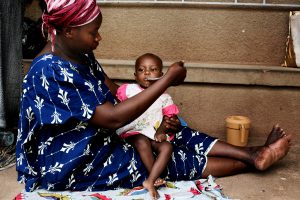
In 1993, Nutriset became a pioneer in developing ready-to-dilute therapeutic milks, F-100 and F-75, aimed to treat severe acute malnutrition. These innovative products were designed in collaboration with nutritionists and in response to the needs expressed by humanitarian organizations.
In 1996, Nutriset transformed malnutrition treatment once again with the creation of Plumpy’Nut®, the first Ready-to-Use Therapeutic Food (RUTF). This ready-to-eat paste required no preparation, enabling a shift to outpatient treatment that significantly increased both the number of children treated and their recovery rates.
Since 2007, RUTFs have been recommended by a joint statement from the World Health Organization (WHO), Unicef, and the World Food Programme (WFP) in the context of this community-based management of severe acute malnutrition (CMAM).
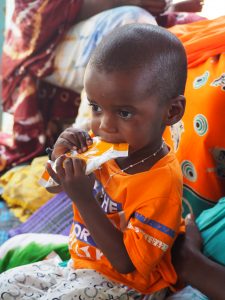
Since 2006, Nutriset has made available to health actors new products aimed at preventing various forms of malnutrition, such as Plumpy’Sup™, Plumpy’Doz™, Enov’Nutributter®+, and Plumpy’Mum™.
These products, known as RUSF (Ready-to-Use Supplementary Food) or Small Quantity Lipid-based Nutrient Supplements (SQ-LNS), compensate for macro or micronutrient deficiencies in the traditional diets of beneficiaries.
At Nutriset Group, the scientific approach to product development is based on partnerships with globally recognized research institutions, public and private organizations, and field actors from the United Nations system or NGOs. The goal is to define the necessary nutritional attributes to enhance the effectiveness of our products and/or adapt care strategies, better understand the social issues and local dietary habits, and support government policies for the treatment and prevention of malnutrition. The central objective of this collaborative approach is to maximize our impact on the beneficiaries.
One of the flagship projects that the Nutriset Group has been committed to for many years is the International Lipid-Based Nutrient Supplements Project (iLiNS Project), which has enabled the development and testing of a new generation of preventive nutritional supplements. This project is a multi-actor international collaborative research effort built through a shared commitment to accelerate progress towards the prevention of malnutrition.
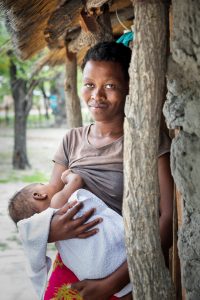
Thus, among many research projects, studies were conducted in Burkina Faso, Ghana, and Malawi among children and pregnant and lactating women, to cover the critical 1000-day period (from conception to the age of 2 years). Lipid-based nutritional supplements (SQ-LNS) were used to fortify the food of pregnant and lactating women as well as children (starting from 6 months).
The results of these studies, combined with other studies using products developed within the Nutriset Group, were integrated into various meta-analyses demonstrating the effectiveness of SQ-LNS in preventing different forms of malnutrition, including stunting, wasting, underweight, micronutrient deficiencies, anemia (Dewey et al. 2021) (Dewey et al. 2022), and reducing the risk of mortality (Stewart et al. 2020).
In 2021, The Lancet published its conclusions. The optimised formulas of LNS designed by Nutriset are recognized not only for reducing growth delays, the risks of wasting and underweight, iron deficiencies, and child mortality, thus protecting them from future risks of malnutrition, but also, when administered to pregnant and lactating women, they allow nutritional optimisation of their pregnancy. A treatment is now possible throughout the thousand days covering the time of nine months of pregnancy and the first two years of the child’s life.
In 2023, the journal Nature Food strengthened the study with new results.
In recent years, the group has been investing in new major areas of malnutrition treatment.
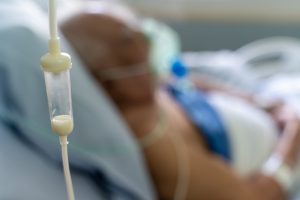
Since 2020, we have been developing specific nutritional solutions tailored to field conditions to meet the needs of people weakened by illness. The latest innovation, NutriHope, aims to provide nutritional support to sick individuals in developing countries by offering a concrete solution to the increased needs of these patients and the challenges of field conditions.

Recently, we have committed to the fight against malnutrition among the elderly in France and have developed Appéti’mix™, an HP/HC (High-Protein and High-Calorie) enriched culinary aid. Studies in real-life applications, especially the one conducted with the Mauriac Hospital Center between 2021 and 2022, have collected numerous data on food intake in this elderly population and evaluated the impact of a new nutritional care strategy. The results show that the use of Appéti’mix™ covers the protein and energy needs of patients while halving the associated costs for the hospital.
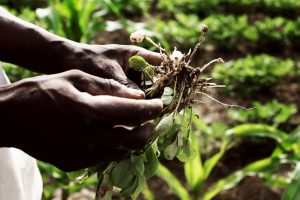
In a context where raw materials have become objects of speculation while their availability is a vital issue for hundreds of millions of people, we are exploring all alternative nutritional and food solutions that could make them accessible to the greatest number in developing countries. The demographic growth of our planet, coupled with climate change, will indeed make access to animal proteins difficult, if not impossible, for everyone.
Facing to this impasse, we are working on new, more accessible and less expensive local plant-based raw materials with diversified origins, and are imagining methods to transform them in order to improve their nutritional value. These research efforts enable us to deploy initiatives within the PlumpyField® network to enhance agro-industrial chains and promote local crops.
Le Groupe Nutriset et le réseau PlumpyField soutiennent et investissent ainsi de nombreux projets.
En savoir plus